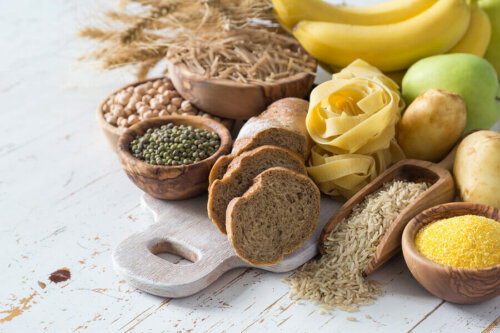How to Increase Your Energy Levels With Your Diet

When it comes to athletes, it’s often necessary to increase energy levels. Either due to excess demand in training or a situation of competitive stress, it’s necessary to resort to certain dietary strategies that allow for greater energy intake.
However, for this, it’s necessary to not neglect the contribution of the rest of the macro and micronutrients. This is to avoid any deficits and complications.
Carbohydrates and energy levels
This macronutrient is the main one in charge of providing energy. This is practically its function, aside from carrying out certain processes at the cellular level. You can find carbohydrates in cereals, rice, and tubers. Its intake should be daily for athletes.
However, the need to manage simple and complex carbohydrate intake is very important. While the former should be reserved for specific moments, the latter should be a fundamental component of an athlete’s diet. Therefore, it’s essential to include rice, potatoes, and pasta in the regular diet.
A noteworthy strategy to increase energy levels at a point in time is hydrate loading. This consists of consuming more sugar than usual during the two days prior to competing, after a previous depletion of glycogen stores.
This allows the body to store more glycogen than usual for a limited period of time, thereby increasing energy and delaying fatigue.

The importance of vitamins and minerals
B-Group vitamins have a significant influence on energy and metabolism. Therefore, its intake is necessary for maximizing the processes of obtaining energy from food. We can find these vitamins in many foods such as fruit, vegetables, and meats.
On the other hand, restrictive diets such as veganism tend to produce a B vitamin deficiency. Due to this, supplementation is necessary in order to avoid deficiencies and ensure the body’s proper function.
Another group of vitamins that’s related to fatigue and energy is vitamin D. There’s a widespread deficiency of this vitamin in the general population. This is mainly because of low sun exposure and poor consumption of oily fish.
Vitamin D is mainly found in fish fats, dairy products, and eggs. Its regular consumption has many positive effects on the prevention of osteoporosis and in the correct functioning of the hormonal system. It has a protective role against many complex diseases and its deficiency can cause chronic tiredness and fatigue.
On the other hand, there are minerals whose deficiency can harm energy levels. A representative case is that of zinc, which intervenes in the metabolism of testosterone. If it’s scarce, it can lead to fatigue and a decrease in muscle strength.
To guarantee a proper supply of minerals, an effective strategy is to introduce a handful of nuts into your diet on a daily basis. These foods, along with a diet rich in fruits and vegetables, will provide the micronutrients that the body needs to function properly.
Other energetic substances
There are some substances with the ability to produce excitation in the central nervous system. The most famous of them all is caffeine, which produces a stimulating effect and delays the onset of fatigue. The use of this ergogenic aid is very interesting in moments prior to training and competition.

However, it must be taken into account that the body generates tolerance to this substance. Therefore, during a competition or game, a slightly higher dose than usual should be used. It should also be noted that on many occasions, caffeine is combined with other stimulating substances such as taurine or ginseng to enhance its effect.
Increased energy levels: conclusion
To increase energy levels in a diet, it’s necessary to take into account the contribution of macro and micronutrients. To do this, you have to slightly increase the intake of quality carbohydrates.
Additionally, one should guarantee the consumption of fruits and vegetables that meet the needs of vitamins and minerals. Finally, it’s also possible to use ergogenic aids that improve the feeling of energy and delay fatigue, as is the case with caffeine.
When it comes to athletes, it’s often necessary to increase energy levels. Either due to excess demand in training or a situation of competitive stress, it’s necessary to resort to certain dietary strategies that allow for greater energy intake.
However, for this, it’s necessary to not neglect the contribution of the rest of the macro and micronutrients. This is to avoid any deficits and complications.
Carbohydrates and energy levels
This macronutrient is the main one in charge of providing energy. This is practically its function, aside from carrying out certain processes at the cellular level. You can find carbohydrates in cereals, rice, and tubers. Its intake should be daily for athletes.
However, the need to manage simple and complex carbohydrate intake is very important. While the former should be reserved for specific moments, the latter should be a fundamental component of an athlete’s diet. Therefore, it’s essential to include rice, potatoes, and pasta in the regular diet.
A noteworthy strategy to increase energy levels at a point in time is hydrate loading. This consists of consuming more sugar than usual during the two days prior to competing, after a previous depletion of glycogen stores.
This allows the body to store more glycogen than usual for a limited period of time, thereby increasing energy and delaying fatigue.

The importance of vitamins and minerals
B-Group vitamins have a significant influence on energy and metabolism. Therefore, its intake is necessary for maximizing the processes of obtaining energy from food. We can find these vitamins in many foods such as fruit, vegetables, and meats.
On the other hand, restrictive diets such as veganism tend to produce a B vitamin deficiency. Due to this, supplementation is necessary in order to avoid deficiencies and ensure the body’s proper function.
Another group of vitamins that’s related to fatigue and energy is vitamin D. There’s a widespread deficiency of this vitamin in the general population. This is mainly because of low sun exposure and poor consumption of oily fish.
Vitamin D is mainly found in fish fats, dairy products, and eggs. Its regular consumption has many positive effects on the prevention of osteoporosis and in the correct functioning of the hormonal system. It has a protective role against many complex diseases and its deficiency can cause chronic tiredness and fatigue.
On the other hand, there are minerals whose deficiency can harm energy levels. A representative case is that of zinc, which intervenes in the metabolism of testosterone. If it’s scarce, it can lead to fatigue and a decrease in muscle strength.
To guarantee a proper supply of minerals, an effective strategy is to introduce a handful of nuts into your diet on a daily basis. These foods, along with a diet rich in fruits and vegetables, will provide the micronutrients that the body needs to function properly.
Other energetic substances
There are some substances with the ability to produce excitation in the central nervous system. The most famous of them all is caffeine, which produces a stimulating effect and delays the onset of fatigue. The use of this ergogenic aid is very interesting in moments prior to training and competition.

However, it must be taken into account that the body generates tolerance to this substance. Therefore, during a competition or game, a slightly higher dose than usual should be used. It should also be noted that on many occasions, caffeine is combined with other stimulating substances such as taurine or ginseng to enhance its effect.
Increased energy levels: conclusion
To increase energy levels in a diet, it’s necessary to take into account the contribution of macro and micronutrients. To do this, you have to slightly increase the intake of quality carbohydrates.
Additionally, one should guarantee the consumption of fruits and vegetables that meet the needs of vitamins and minerals. Finally, it’s also possible to use ergogenic aids that improve the feeling of energy and delay fatigue, as is the case with caffeine.
All cited sources were thoroughly reviewed by our team to ensure their quality, reliability, currency, and validity. The bibliography of this article was considered reliable and of academic or scientific accuracy.
- Stingl H., Chandramouli V., Schumann WC., Brehm A., Nowotny P., Waldhausl W., Landau BR., Roden M., Changes in hepatic glycogen cycling during a glucose load in healthy humans. Diabetología, 2006. 49 (2): 360-8.
- Cappelletti S., Piacentino D., Sani G., Aromatario M., Caffeine: cognitive and physical performance enhancer or psychoactive drug? Curr Neuropharmacol, 2015. 13 (1): 71-88.
This text is provided for informational purposes only and does not replace consultation with a professional. If in doubt, consult your specialist.








